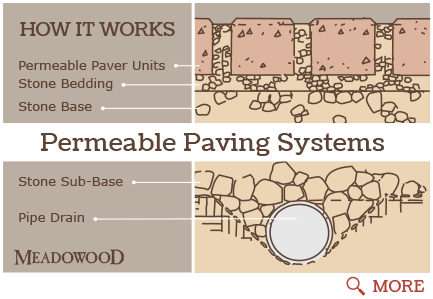
PERMEABLE PAVING SYSTEM
What is a permeable paving system?
A Permeable Paving System is an integrated approach to driveway, patio or sidewalk construction that incorporates sustainable materials and techniques to create an attractive and durable surface that also functions as a repository for stormwater and a filter to reduce pollutants in runoff. In a typical residential installation, the Permeable Paving System includes a top layer of pavers and a structural base made of open-graded or engineered stone to maintain permeability and facilitate water flow. Both the pavers and the base are chosen and engineered to accommodate the specifics of the existing soil at the installation location.
Permeable paving system vs. "porous" or "pervious" driveway or patio products
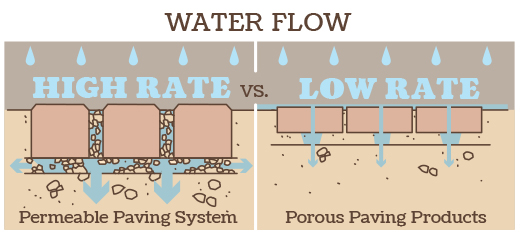
In comparing a Permeable Paving System with other methods
for topping your driveway or patio, you may encounter terminology that sounds like a Permeable Paving System but is really not at
all the same.
Pervious Pavement or Porous Pavement are paving products (such as stones or poured slabs) that are engineered to allow water to seep slowly through them. The paving material itself is water permeable. The materials between these pavers (if any) are not. Such surfaces mitigate runoff to a degree, but are ineffective for higher flow rates and tend to “clog” with tiny particles of dust or sand over time. By comparison, a Permeable Paving System is not a “product.” It is a “system” that allows rainwater to pass around a pattern of impervious pavers as opposed to passing through the pavers themselves. The rock-based media that surrounds and supports the pavers through which the water flows is much less subject to clogging.
Concrete Grid Pavements are concrete paving cells that typically contain topsoil and grass. These paving units do allow water to permeate through the grass areas, but at rates much lower than a Permeable Paving System. In addition, concrete grids typically
lack the open-graded or engineered stone base the Permeable
Paving System includes for water storage. Moreover, concrete grids are intended for intermittently trafficked areas, such as overflow parking and emergency fire lanes, and are not durable enough for frequent use.
Permeable paving system vs. "porous" or "pervious" driveway or patio products
A Permeable Paving System can have many benefits, depending on the needs of your project.
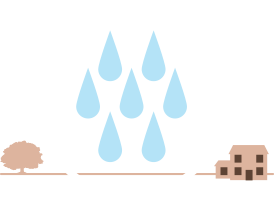 Ecology. Permeable Paving is an environmentally sensitive solution for your unique project. Your driveway or patio can double as a stormwater management solution, reduce runoff from your property and contribute to less erosion elsewhere. Make sure your neighbors know your beautiful new driveway is also completely “green.”
Ecology. Permeable Paving is an environmentally sensitive solution for your unique project. Your driveway or patio can double as a stormwater management solution, reduce runoff from your property and contribute to less erosion elsewhere. Make sure your neighbors know your beautiful new driveway is also completely “green.”
Regulatory Compliance. With increases in land development over the past two decades the United States Environmental Protection Agency (EPA), the Minnesota Pollution Control Agency (MPCA), local municipalities and other land use regulators have become increasingly relevant to home improvement decisions. Using a Permeable Paving System in your landscaping and design will help you meet regulatory standards for water drainage and control.
Landscaping Design. Free up your architect or designer by addressing water filtration, storage and runoff concerns with your paved areas. Your Permeably Paved driveway mitigates erosion and stores extra water for tree roots or shrubs giving your consultants maximum design flexibility.
Why choose a permeable paving system?
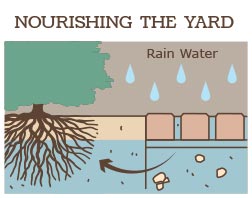 Adding a new driveway or patio with a Permeable Paving System creates an attractive, durable surface accommodating a wide range of pedestrian and vehicular applications. And it’s a functional design feature that will add beauty and value to your home. A few advantages you might find useful are the following:
Adding a new driveway or patio with a Permeable Paving System creates an attractive, durable surface accommodating a wide range of pedestrian and vehicular applications. And it’s a functional design feature that will add beauty and value to your home. A few advantages you might find useful are the following:
- Increases your property value. Provides superior curb appeal while maintaining a light
ecological footprint. - Provides a distinctive look for your home at a cost comparable to concrete.
- Reduces erosion due to water flow. Keeps your own landscaping intact while contributing to overall community water management goals.
- Maximizes groundwater recharge and/or storage. Allows as much rainfall as possible to soak into the soil, preparing it for periods of drought.
- Reduces total runoff to less than 15% (compared to grass at 45%, without treatment). It’s true. Your driveway will retain more rainfall than your lawn.
- Seasonal reduction of snowmelt runoff. Thermal layer created in the rock sub-structure allows for seasonal infiltration.
- Allows for retention and storage of stormwater for possible re-use for irrigation or other non-potable uses.
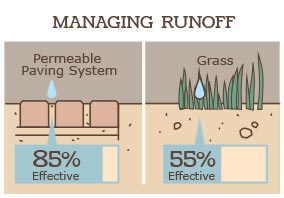
- Allows better land-use planning and more efficient use of available land for greater economic value, especially in high-density, urban areas.
- Contributes a low-impact solution to your paving needs.
- Is the most environmentally responsible driveway or patio system you can buy.


